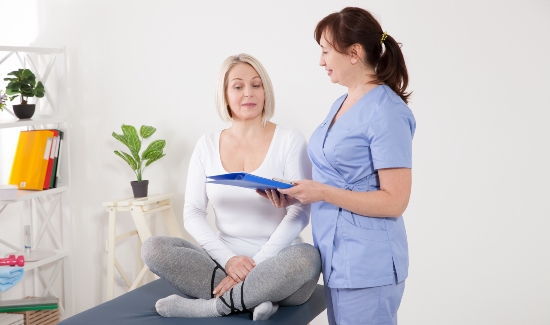Menopause Lifecycle Care

Menopause Treatment in Fort Collins & Loveland
Menopause happens to all women and is a natural part of the aging process. Symptoms of menopause can be uncomfortable and affect your regular daily routine, lifestyle, quality of life, and enjoyment of hobbies and interests. At The Women’s Clinic of Northern Colorado, our goal is to find the safest and most effective treatment for menopause for each patient. We will work closely with you to understand your symptoms and lifestyle so that we can create a highly individualized treatment plan for you. Call us today to schedule a consultation to discuss your options for menopause treatment in Fort Collins or Loveland, CO.
What Is Menopause?
Menopause is an age-related condition that affects women. It is defined as the absence of a menstrual period for 12 consecutive months or longer. For most women, menopause occurs around the age of 50-55. The time frame before menopause is called perimenopause, and after menopause is called post-menopause. The symptoms of menopause occur due to an imbalance of hormones or low levels of hormones during perimenopause and menopause.
Three Stages of Menopause
Menopause occurs in three stages. Menopause is a natural part of aging and doesn’t happen because of an illness, medical condition, or medical treatment. It happens gradually and in three stages:
- Perimenopause – For some women, menopause symptoms occur 8-10 years before menopause. This can happen as your body naturally starts producing less estrogen. Some women experience perimenopause in their 40s, and the symptoms last until menopause.
- Menopause – Menopause occurs when you no longer have menstrual periods and haven’t for at least 12 months.
- Post-Menopause – Post-menopause is the time after your menstrual periods have stopped. You may experience lessening menopausal
Symptoms of Menopause
Not everyone experiences all the symptoms of menopause. Some women may have extreme, severe, and long-lasting symptoms, while others have few or almost no symptoms at all. You may be entering perimenopause or menopause if you experience any of these symptoms:
- Hot flashes
- Night sweats
- Fatigue
- Irritability, depression, or anxiety
- Trouble sleeping
- Mood swings
- Vaginal dryness
- Low libido
- Urinary urgency
- Dry skin, eyes, or mouth
- Breast tenderness
- Worsening of PMS
- Irregular periods
- Headaches
- Joint and muscle aches
- Trouble concentrating
- Weight gain
- Hair loss or thinning hair
Who Needs Treatment for Menopause?
If you have menopausal symptoms that are impacting your quality of life, you should explore your treatment options. Menopause treatment can lessen your symptoms and improve your quality of life. In general, the best candidates for menopause treatment are women who are between 40-59 and who are in perimenopause or menopause.
What Is Menopause Treatment?
Menopause treatment is a highly individualized plan that addresses your symptoms, age, overall health, and lifestyle. Your treatment options will depend on your age, health, and severity of symptoms. We will weigh the risks against the benefits and review your treatment options with you so that you can make an informed decision about your healthcare. Some women don’t need menopause treatment at all or elect to forego treatment because their symptoms are not that severe.
Treatment for Menopause Symptoms
Your menopause treatment will be highly individualized to your specific health, symptoms, needs, and goals. There are a lot of different treatment options for menopause, including all-natural or alternative treatment options and conventional treatment options. The most common treatment options are:
- Hormone Replacement Therapy – Hormone replacement therapy uses synthetic or bioidentical hormones to replace the estrogen and progesterone levels in your blood. This can relieve or reduce symptoms like hot flashes, low libido, loss of energy, and vaginal dryness. Hormone replacement therapy can also lower your risk of osteoporosis.
- Non-Hormonal Treatments – If you aren’t a good candidate for hormone replacement therapy or if you don’t want to undergo HRT, you can consider non-hormonal treatment options for menopause. Non-hormonal treatment includes lifestyle changes, changes to your diet, an increase in exercise, prescription medications, and undergoing therapy or joining a support group.
Why Choose The Women’s Clinic of Northern Colorado
At The Women’s Clinic of Northern Colorado, we specialize in women’s primary health care and preventive healthcare. We have been serving our community since 1965 and have always been at the forefront of our field. We offer treatment in our comfortable, welcoming, state-of-the-art clinics in Fort Collins and Loveland, CO. Each member of our team is compassionate, extremely qualified, and skilled. Our mission is to always care for all women. Our goal is to be a pioneer in providing the best care for women.
Schedule a Consultation for Menopause Treatment
Call us today or contact us online to schedule a consultation to discuss how we can help you with your menopause symptoms and treatment in Fort Collins, CO, or Loveland, CO. We will complete diagnostic testing to assess your stage of menopause and evaluate your hormone levels. We will then recommend a highly personalized menopause treatment plan.





